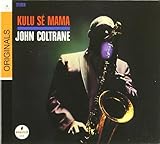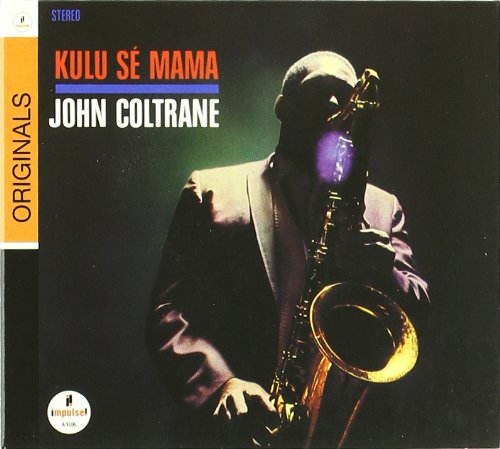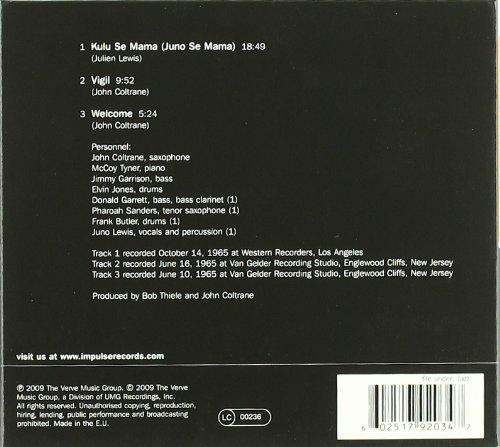John Coltrane Album: «Kulu Se Mama»

- Customers rating: (4.8 of 5)
- Title:Kulu Se Mama
- Release date:2009-03-24
- Type:Audio CD
- Label:Verve
- UPC:602517920347
- Average (4.8 of 5)(18 votes)
- .15 votes
- .3 votes
- .0 votes
- .0 votes
- .0 votes
- 1Kulu Sé Mama (Juno Sé Mama) - John Coltrane
- 2Vigil - John Coltrane
- 3Welcome - John Coltrane
There are Coltrane enthusiasts and then there are Coltrane enthusiasts. Since Trane was an artist whose style changed dramatically at least 4 or 5 times in his career, there are jazz fans who like only one or two or three of Trane's periods and can't stand his others. The critical consensus is that his work from 1965 till his death in 1967 is the most controversial. It is during this period that Trane, who came up through traditional jazz forms, moved deeper and deeper into free jazz. The beauty of the Kulu Se Mama disc is that it is informed by Trane's study of free form styles, but it is sufficiently structured so as to avoid derailing entirely into atonal, unmetered chaos. The title track is sublime with Juno Lewis's singing and percussion giving the tune shape while the horns piano and drums around him explore and radically push the envelope of the simple folk melody. This is a track where African flavored folk, hard bop, modal and free form jazz not only converge but converge successfully--it is a work of true and "new thing" beauty. "Vigil" is a duet between Trane and the classic Quartet's drummer Elvin Jones. The track is intense and intentionally not serene (the liner notes tell us that Trane meant the track as an encouragement to be vigilant against forces that are spiritually damaging and one can hear just such a struggle in Coltrane's playing). "Welcome" is a beautifully serene melody. This is tranquil music that doesn't belong in an elevator as the classic Quartet lays down one of its most conventionally beautiful tracks. "Selflessness" wasn't included with the original album--whether you will enjoy this track depends on whether you enjoy free form jazz. Typical of this period in Coltrane's career, the theme is short and discarded rather quickly and the band moves into an open form exploration of the line-up's potential. "Dusk Dawn" is a classic Quartet track with another quickly discarded theme and an open (but not exactly free) collective improvisation. I believe this is an essential Coltrane album. For the value of the title track alone, no modern jazz collection is complete without this disc. I value it above Ascension and Meditations.
Kulu Se Mama is one of the greatest works in the history of jazz. That's an understatement. Kulu goes beyond the limits of genre. It exists in the stratosphere of self determined art. It must be heard as an entire work, from start to finish. Simultaneously psychedelic, spiritual, soulful, preaching, pleading, angry, accepting, unsettling and healing. This is the voice of the mountaintop, the capstone of the great pyramid, the well of Chac the rain god, the lightening bolt, the philosopher's stone, Kaddish and serenade. This is it.
"Passage to Africa/Passage to more than Africa.." apologies to Walt Whitman. This was probably the second Coltrane vinyl I bought more than forty years ago. I'd been thrilled by the blocked chords of Tyner's solo in the title tune. Other favorite parts of "Kulu Se Mama" include: the warmth of Coltrane's opening statement after the vocals and how his sound is limned by Pharoah's raspy echo. I also was struck very much by the counterpoint between Juno Lewis' voice and the bass clarinet lines of Donald Rafael Garrett toward the end of the piece, as well as the hypnotic sounds of the little percussion instruments. Vinyl time limits in those days limited the tunes to the clarion warnings of "Vigil" and the simple, aching beauty of "Welcome" which reduced at least one dear friend to tears on a first hearing. "Vigil" is a difficult piece emotionally, rather like Dante's dark woods. All thanks to Impulse for including the wonderful "Selflessness" in the present CD; I've always loved this, especially for the strength of Pharoah's playing and how his lines spiral Coltrane to higher levels. Is "Dusk Dawn" related to the "Sun Ship" sessions? It almost seems so to these ears. In addition, I'd like to have a poster of the cover design. I'd have to agree with those who regard this as an essential Coltrane disc.
Update #3: six months later, still my favorite Trane and one of my favorite jazz releases.
Update #2: After a month, I can honestly write that this is my very favorite Coltrane CD and I have almost every CD from his first Prestige session as a leader up through Meditations (still need to get Expression). Yes, I love A Love Supreme, Sun Ship, Live at Birdland, Village Vanguard, Ascension, Giant Steps, Favorite Things and so on. But there is something about this CD that really has its hooks in me and I can't get away from it. The track Selflessness is the most wonderful piece of music I have ever heard. It's free form and frantic but joyous at the same time. It's almost like a spiritual celebration. I will NEVER get tired of Selflessness. It's easily my favorite Coltrane track.
those who have trouble accessing or getting close to Coltrane's free music from June 65 forward should pick this up along with Sun Ship. The playing is free, intense, but it's also grounded in central time signatures and tonal centers (it shifts constantly but it is there).
I wish I could give this 10,000 stars. it is my favorite recording of all time and I have a HUGE library of music.
Update: I've had this CD for about 2 weeks now and just can't stop playing it. It is such wonderful music and it's a very different Coltrane release. I own maybe 90 Miles Davis CDs. 30 Coltrane CDs and dozens of Blue Note releases by Shorter, McClean, Dolphy, Morgan, Hancock and so on. This is by far the coolest recording I own. I can't stop playing the title track and Selflessness. Simply amazing, wonderful, beautiful, intense.
Original Review:
Kulu Se' Mama is probably the most "organic" sounding release from Trane's catalog. Juno Lewis is a wonderful addition and appears on the title piece and Selflessness. Lewis sings and plays a variety of drums and the conch shell. The first time I listened I heard a sound that wasn't quite like a flute and not quite like someone singing soprano, then I looked at the musician credits on the CD cover and discovered it was a conch shell. Yeah, organic is definitely the right word.
There's a lot of music here, the two tracks by an expanded group include Juno Lewis, Frank Butler, Donald Garrett and Pharaoh Sanders really stand out. There's a Trane/Jones drum and sax duet (Vigil) that points toward the Interstellar Space sessions with Rashied Ali. There's also a couple of pieces by the Quartet itself.
My favorite tracks are Kulu Se' Mama, Selflessness (there's so much joy in this piece of music, it's just wonderful) and Welcome. There's a lot of free playing of course but it isn't as "unapproachable" as some might find in works like "Meditations" or "Ascension" (I happen to love 'em). You certainly can't listen to the expanded ensemble using the ears you use to listen to "My Favorite Things" or "A Love Supreme", but if you relax and just let the music happen, I believe even those who really don't like free jazz will learn to appreciate the beauty within this music.
Selflessness has a wonderfully intense moment where, after the horns have soloed and Tyner is wrapping up his solo lines, right at the 9 minute mark (that had to have been timed deliberately) the horns come back in with fierce intensity. It's pure elation... rapture! This is one of the great moments in Coltrane's recorded legacy in my opinion.
Kulu Se' Mama is great stuff. If you like Trane's mid sixties material and are a bit wary of the later stuff then this is an excellent release for getting your feet (ears?) wet.
i don't truly get jazz that is too abstact, as i find coltrane can be, but kulu se mama abstacts AND holds together with a repeating melodic theme that intensifies throughout the track. It is a homage and summoning of the power in nature and of the soul; this piece of music SUMMONS a profound invocation to the point of being almost reverentially occultic, it could be one of the deepest things in jazz so do check it out.


